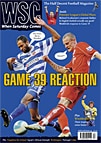 Spectacle takes precedence over players
Spectacle takes precedence over players
The broken leg suffered by Eduardo three minutes into Arsenal’s match at Birmingham prompted a swift and furious reaction, with Arsène Wenger’s call for a life ban for Eduardo’s assailant Martin Taylor, which he retracted a few hours later. However, Wenger’s request for analysis of the real problems in the game and concern that “if the newspapers all want to talk about [William] Gallas then Taylor will get away with it” was largely ignored in coverage of the incident.
Many reporters, as if trying to prove Wenger right, concentrated on Gallas’s petulance rather than Taylor’s tackle or what it might suggest about the game. In the Sun, Steven Howard attacked “self-indulgent” Gallas, dismissing the injury as “one of those things that occasionally happens”. In the News of the World, Rob Beasley’s report began: “Ignore the horrific injury and X-rated tackle, if you can. For this match may have far more significance than simply a broken leg… Think that’s an exaggeration? Then you must have missed the madness of Gallas at the climax of this incident‑packed encounter.”
In descriptions of his challenge, Taylor was reborn as a victim nicknamed “Tiny”, a man whose hair had been shorn at Blackburn in a failed attempt to make him more fearsome, a man studying political science at the Open University. Steve Bruce wondered if Taylor would need counselling, team‑mate Stephen Kelly thought the sending-off was “harsh” and Graeme Souness described him as the “perfect son-in-law”.
Wider analysis could be found, however. Souness may be who the Times’s Simon Barnes had in mind when referring to “the legion of ex-pros and their sycophants” pushing an “incessant plea of liberalisation” on to the game. The laws that had been “designed to protect players and promote excellence” were now “ever so slightly twisted in the interests of spectacle”, making incidents like this inevitable. Barnes’s colleague Martin Samuel pointed out that “the vicious tackle has always been the worm in the apple of the English game” and he neatly summarised the reaction to Taylor’s tackle: “What should have been a watershed event is trivialised by a round of catcalling.”
Almost everywhere else in the football world, the tackle is widely considered a last resort. But not here, where physicality is prized – teams go out to “stop” each other, so pre‑emptive violence is rife and applauded. Taylor continued to express regret long after the incident. But unfortunately our football culture encourages recklessness and we have referees unable or unwilling to act upon it, mixed with a game played at breakneck speed. With the media largely in denial about all this, whether Taylor’s challenge was malicious or not really doesn’t matter. Ed Upright
From WSC 254 April 2008